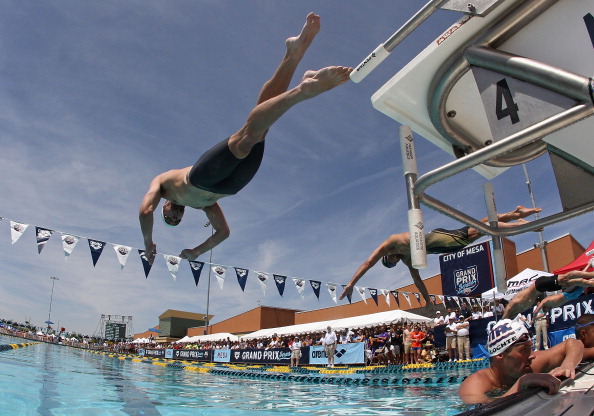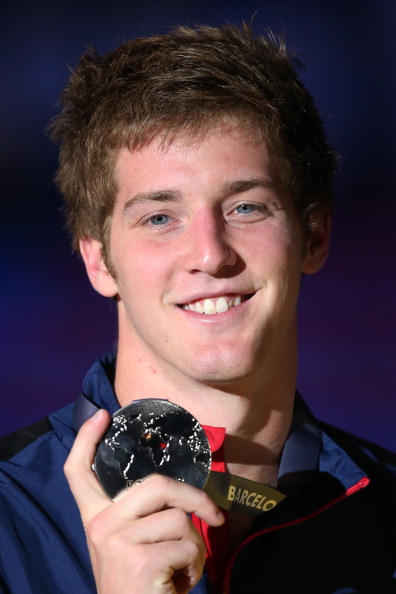Thirty years ago, amid the delivery of the Los Angeles 1984 Olympic Games, which proved a huge success, Peter Ueberroth reminded the world of a classic strategy. It works in business. It works in sports. Really, it’s the best strategy for pretty much everything. You under-promise and then you over-deliver.
This is what Michael Phelps and his longtime coach and mentor, Bob Bowman, are doing now in these very first days of the comeback story likely to dominate every swimming story between now and the Rio Summer 2016 Olympic Games.
Michael’s goals? Fun, man. Just here to have fun. 2016? Whatever. Not thinking that far ahead. Just taking it one step at a time. We’ll get there when we get there.
It’s completely shrewd, sophisticated and dazzling in its brilliance.
After years of chasing hard goals — eight-for-eight golds in Beijing, the gymnast Larisa Latynina’s record of 18 overall medals in London — there’s nothing left for Phelps to prove to anyone. He is The Man, and has absolutely, unequivocally earned the right to do this on his own terms.
The thing is, it’s also true.
Enough.
Because, for sure, Phelps has goals. He always has goals.
As he said Wednesday at a news conference, “I always have goals and things that I want to achieve and I have things that I want to achieve now. Bob and I can do anything that we put our minds to.”
Because, for real, Phelps and Bowman assuredly have not through every detail of what the master plan is to get to and through Rio. No way, no how.
Why?
Because it’s April 2014 and they don’t have to.
All Phelps — and Bowman— have to do, right now, is enough to keep the train moving.
Which, as Phelps proved Thursday in sun-blinded Mesa, Arizona, is plenty good enough.
In his first race back after 628 days away, since his butterfly leg in the gold medal-winning leg in the 4x100 medley relay at London 2012 Games, Phelps was put in the last of the 14 heats in the 100 fly.
Phelps watched as rival Ryan Lochte, in Heat 13, went 52.94.
Lochte swam in Lane 4. Phelps drew Lane 4, too. The two of them yukked it up about something as Phelps stepped on the blocks — maybe the absurdity of a jillion cameras recording every move Phelps was making while Lochte, still in the water below, got to watch while Phelps dove over him as Heat 14 got underway.
All Phelps did in Heat 14 was throw down a 52.84, the morning’s fastest time.
Yeah. He was back.
“I felt like a kid, you know, being able to race again and be back at a meet,” Phelps told longtime friend Rowdy Gaines, the 1984 Olympic champion in Mesa working television for Universal Sports.
“I literally felt like a 10-year-old kid, just enjoying it,” Phelps said, which is great, except that the next time a 10-year-old kid throws a 52.8 in the 100 fly please call USA Swimming because that kid needs to be in the Olympics immediately.
The only thing that didn’t go according to script: Phelps usually lags behind the field in the first 50 meters, often making the turn in seventh place. On Thursday morning, he was second. He split the first 50 in 25.15 seconds, the second in 27.69.
All you doubters? Haters? Come on. This is Phelps. He is one of the most competitive human beings ever to inhabit Planet Earth. Did you think he was somehow going to forget how to race?
Especially in the 100 fly, the event in which he is the three-time Olympic champion as well as the world and American record-holder.
This is what Phelps does, and better than anyone, and especially in the butterfly — which is what he is likely to concentrate on going forward.
Do you think — just riffing here — that he would want to try going forward to make amends for the 200 fly in London, a race he seemingly had won but then glided at the end when he shouldn’t have, and South Africa’s Chad le Clos stole by five-hundredths of a second?
Wouldn’t that — just being logical — be a “goal and thing … to achieve now”?
The 200 fly is the Phelps family race; older sister, Whitney, came into the 1996 U.S. Trials in Indianapolis with the best time in the country in the event, and younger brother Michael is a two-time Olympic champion, one of those wins, in Beijing, a then-world record 1:52.03, set with his goggles filled with water.
As amazing as the eight-for-eight is, and it is, the 100 fly three-peat —which by comparison bizarrely gets almost no love — is a profound accomplishment, because that race is so short and in it anything — as the 2008 final, won by one-hundredth of a second, proves — can happen.
Now that 200 fly three-peat is still out there.
Of course, no decisions have been made, or at least announced publicly. It’s possible the 200 individual medley might yet appear on the agenda, too. Or the 100 free. Who knows? Again, and for emphasis: it’s very early.
The prelim set Phelps and Lochte up for Thursday night’s 100 fly final.
Lochte had himself a way busier evening than Phelps. He first swam the 100 free, finishing fourth, in 49.68, behind 2012 Olympic gold medalist Nathan Adrian’s 48.23.
Adrian’s 48.23 will get lost in the swirl but it shouldn’t. It’s the start of the American season and it’s already the third-best time in the world in 2014 — two Australians, James Magnussen, 47.59, and Cameron McEvoy, 47.65, have gone faster, and the Aussies have already had their national championships.
Adrian won by more than a second; South Africa’s Roland Schoeman finished second, in 49.39.
Another race destined to get missed by all but the most hardy swim geeks — about a half-hour after that 100 free, Katie Ledecky swam the women’s 400 free in 4:03.84, which equaled the world’s best time in 2014. Afterward, she wasn’t even breathing hard.
Lochte got done with the 100 free at 5:11 p.m. local time.
The men’s 100 fly started an hour later.
Once again, at the turn, Phelps — in Lane 4 — was second, in 24.76.
This time, Lochte — in Lane 5 — was first, in 24.64.
The Phelps M.O. over the years has been to pour it on in the back half. Lochte knows this.
In Phelps' first competitive final of 2014, it wasn’t there. Lochte held Phelps off, winning in 51.93. Phelps touched second, in 52.13.
Give Lochte credit. That 51.93 was the second-best time in the world in 2014. Only Takuro Fujii, with a 51.84 at the Japanese nationals, has gone faster.
Phelps, meanwhile, with 52.13, is tied for fourth-best in 2014. Already.
“Down there at the turn, I kind of peeked over, I saw him, and I almost started smiling,” Lochte said in a poolside interview with Gaines that was broadcast live over the PA system in Mesa as well.
“Why? Because you were winning? Because you were ahead?” Phelps said, and everyone laughed.
Gaines, turning to Phelps, asked, what now?
“I’m my hardest critic,” Phelps said, “so I know what I can do there. But, like I have been saying this whole time, I am having fun. I really do mean that. There’s nothing like coming here, swimming before a packed stands — they’re cheering us on, helping us get through the race.
“Obviously, being back in the water with Ryan, it’s always fun when we race. Neither one of us wants to lose to each other. But that’s what makes us faster and faster each time.”
The interview actually began with Gaines asking Lochte if he had noticed anything different about swimming Thursday in Mesa — what with, you know, Phelps back.
Lochte laughed. He said, “I mean, especially this morning, seeing all these cameras, right before I’m about to race — I’m like, ‘Thanks, Michael.’ “
Phelps is back. Lochte, too, from that freaky knee injury.
Jeah, dudes.
For U.S. swimming, it’s all good.






